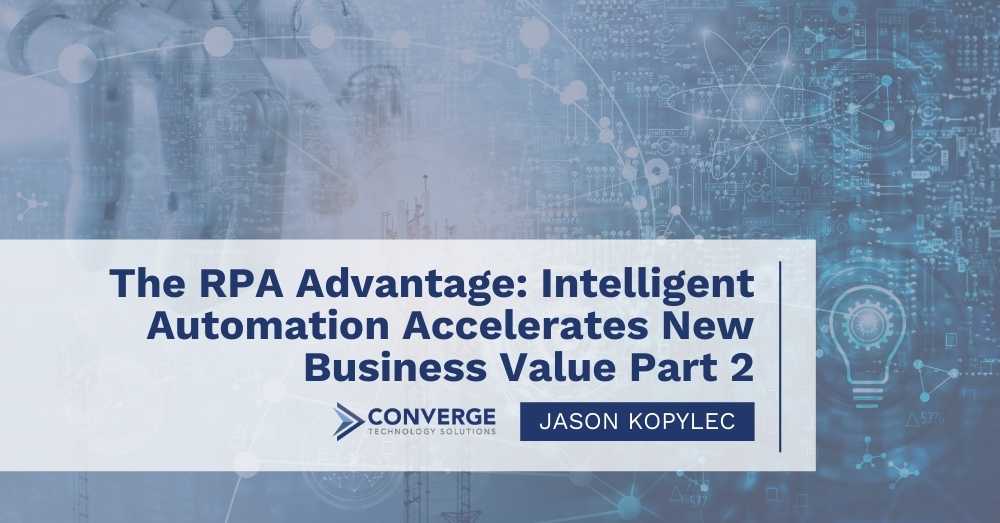In my last blog, I detailed the history of Robotic Process Automation (RPA), how it has evolved, and how to get started with a solution. In this blog, I’m going to discuss a detailed use case of how we built, managed, and maintained an RPA solution for a large legal organization.
Robotic Process Automation (RPA) presents a real opportunity for organizations to drive efficiency and value for their businesses. Automation of time-consuming and complex tasks frees employees to focus on true knowledge work.
Let’s take a look how one legal organization used RPA to automate their previously manual-intensive communications processing operation.
How RPA drove smart efficiency for a legal organization
A large legal organization with over 1,000 lawyers needed to process sizable volumes of physical mail and email to support its legal teams and operations. This manual-intensive process involved a large department of mail handlers to sort paper mail, scan it, and email it to the correct department for further action. The organization also had a team of ten employees to read emails and forward them on to different legal teams to do the filings.
The legal organization was interested in exploring an opportunity to instead use RPA to automate this large and manual-intensive operation. “Robots,” after all, don’t take breaks or need sick days, and they can work during business interruptions, court closures, and when traffic is bad. The organization partnered with Converge to deliver an end-to-end RPA solution to bring new efficiency and speed to their mail processing operation. This was done for the organization’s email process and a significant portion of their physical mail, which is scanned and digitally converted.
Converge implemented RPA-powered Virtual Agents. These digital “robots” read each of the organization’s incoming emails and understand the material in the email attachments. Based on this context, the intelligent Virtual Agents are then able to automatically take the right action on what needs to be done next. For example, the AI might file the material away if no further action is needed. Or, if action is needed, it can look up the relevant case number, identify the associated legal team, and forward it to them.
If, on the other hand, the AI’s confidence on the right next action is not high, or if it is a new process, it will instead send the email to a small team of humans for manual routing. The power of the AI is that it will monitor the action the human team takes to automatically retrain its internal AI model, so the next time a similar email comes in, the AI will have a better chance of processing it on its own.
Converge trained the AI using the legal organization’s mail to enable these intelligent processing capabilities. The engagement was an elegant blend of traditional operational RPA capabilities (such as scanning mail, downloading files, and sending email) and higher-order expertise RPA, which involves actually understanding what is in the emails and how to classify them (e.g., urgent), which in turn, involves understanding context and demonstrating “human-like” expertise.
On the people side of the engagement, Converge worked with the legal organization’s lines of business, not just IT, to analyze their business needs and teach them about AI techniques. From there, Converge built, managed, and maintained the RPA solution, and the engagement has turned into a mature, long-term relationship with the client.
Moving forward with RPA
Over the past decade, Converge has guided organizations through successful, cloud-based application implementations of all stripes and sizes—be it cloud, hybrid-cloud, or multi-cloud. With cloud vendor partnerships—among the largest players being Amazon Web Services, MS Azure, Google Cloud Platform, and IBM Cloud—our AI/AppDev strike teams are staged to partner with businesses as they embark on the Intelligent RPA journey.
Whether a company is just starting to think about automation or is already well down the path, the right RPA solution and partner can help uncover new possibilities for automation and deliver new efficiencies in time and cost savings. When it comes to deploying RPA, there are many things to consider, including technology choices, business strategy, and the implementation process. With an end-to-end approach to RPA—from building models to deploying AI—Converge is here to help you make it happen. Let’s start a conversation on your next step with RPA.




